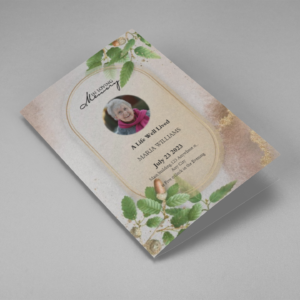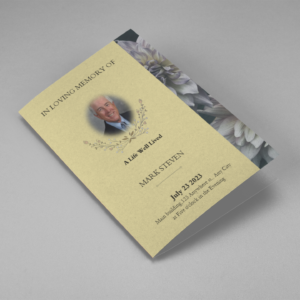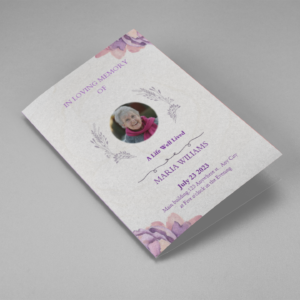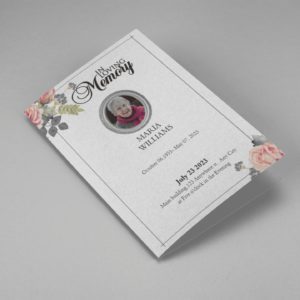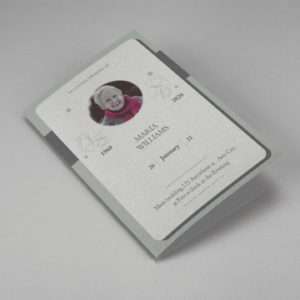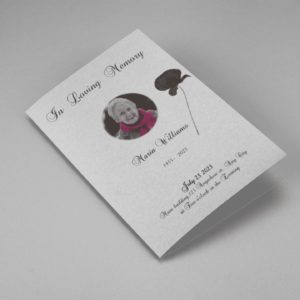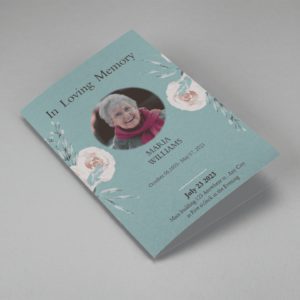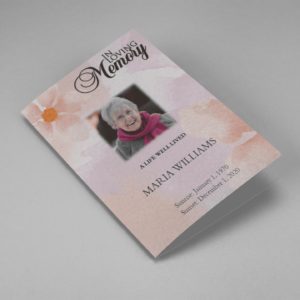Funeral Arrangements encompass the necessary preparations and ceremonies to honor and remember a deceased individual. They provide a platform for grieving and paying tribute to the departed. These arrangements typically involve various elements, such as selecting a funeral home, deciding on burial or cremation, organizing visitation hours, and coordinating the funeral service itself. Additionally, choices regarding caskets or urns, floral arrangements, music, and readings contribute to the overall atmosphere. Funeral arrangements often include considerations of religious or cultural traditions, personal preferences, and financial constraints. They aim to create a meaningful farewell, allowing friends and family to gather, share memories, find solace, and find closure as they bid farewell to their loved ones.
Why Funeral Arrangement?
Funeral arrangements are essential for several reasons:
- Honoring the Deceased: Funeral arrangements provide an opportunity to honor and pay respect to the deceased. They allow family, friends, and loved ones to come together to commemorate the life lived, express their grief, and say their final goodbyes.
- Closure and Emotional Support: Funerals offer a space for mourning and grieving. They provide a structured environment where individuals can openly express their emotions, share memories, and find comfort in the presence and support of others who are going through a similar loss.
- Ritual and Tradition: Funeral arrangements often incorporate religious or cultural rituals and traditions. These customs provide a sense of continuity, help mourners navigate the grieving process, and offer a framework for understanding and accepting death.
- Gathering of Community: Funerals bring together a community of family, friends, and acquaintances who may not have seen each other for some time. It provides an opportunity for them to reconnect, offer condolences, and provide support to one another.
- Closure and Moving Forward: Funerals help facilitate the process of closure and acceptance. They mark the transition from the presence of the deceased to their memory, allowing mourners to begin their journey of healing and moving forward with their lives.
- Legal and Practical Considerations: Funeral arrangements involve important administrative tasks, such as obtaining death certificates, handling legal documentation, and addressing financial matters related to the deceased’s estate and insurance policies.
Components Of Funeral Arrangement
Funeral arrangements include several key components:
Selection of Funeral Home
Choosing a funeral home or mortuary to handle the logistics and arrangements for the funeral service.
Determining Burial or Cremation
Deciding whether the deceased will be buried in a cemetery or cremated. This choice impacts subsequent decisions.
Visitation and Viewing
Organizing visitation hours for family and friends to pay their respects and view the deceased before the funeral.
Funeral Service Planning
Coordinating the details of the funeral service, including the location, date, and time. This involves deciding on religious or non-religious elements, and selecting readings, music, and speakers.
Casket Selection
Choosing an appropriate casket for burial or an urn for the storage of cremated remains. These choices can vary in materials, design, and cost.
Floral Arrangements
Selecting and arranging floral tributes, wreaths, and bouquets to adorn the funeral service and casket.
Obituary and Death Notices
Composing an obituary to announce the death and provide details about the deceased’s life, as well as placing death notices in newspapers or online platforms.
Transportation Arrangements
Coordinating transportation of the deceased’s body from the place of death to the funeral home, as well as arranging transportation for family members and mourners to the funeral service and cemetery.
Reception or Gathering
Planning a post-funeral gathering or reception where family and friends can gather to share memories, offer condolences, and find support.
Legal and Administrative Matters
Addressing necessary legal documentation, such as obtaining death certificates and handling insurance claims, and notifying relevant authorities.
Types Of Funeral Arrangements
There are several types of funeral arrangements, each offering different options for honoring the deceased and meeting the needs and preferences of the family. Here are some common types:
- Traditional Funeral: This is the most common type, featuring a visitation or wake, a formal funeral service, and a procession to the cemetery for burial. It typically follows religious or cultural traditions and includes elements like prayers, readings, music, and eulogies.
- Memorial Service: A memorial service is held without the body present, offering an opportunity to remember and celebrate the life of the deceased. It can take place in a funeral home, church, community center, or other meaningful locations.
- Graveside Service: This type of funeral takes place entirely at the cemetery, with a short service held at the gravesite before the burial or interment of the cremated remains. It is usually more intimate and less formal than a traditional funeral.
- Cremation Service: When cremation is chosen, a memorial service or gathering can be held before or after the cremation. The service may include the presence of an urn containing the cremated remains, along with personalized tributes and rituals.
- Green or Natural Burial: This environmentally friendly option involves burying the deceased’s body in a biodegradable casket or shroud, without embalming or the use of concrete vaults. It promotes ecological sustainability and return to nature.
- Direct Burial or Cremation: With this arrangement, the body is buried or cremated shortly after death, without a formal funeral service. A memorial or celebration of life can be held at a later date if desired.
- Home Funeral: Some families choose to care for the deceased’s body at home, arranging a DIY funeral. This may involve keeping the body at home, conducting rituals, and involving family and friends in the preparation and vigil.
- Online or Virtual Funeral: In situations where physical gatherings are challenging, virtual funeral arrangements allow mourners to participate remotely through video conferencing platforms. It includes virtual memorial services, online guest books, and live streaming of the funeral.
Funeral Arrangements Template
-
Searching for a Oak Leaf With Gold Oval Frame Half Page Funeral Program that is easy to print and amass and has a cutting-edge look? The Oak Leaf With Gold Oval Frame Half Page Funeral Program is the Perfect decision because it measures 8.5”x 5.5”.
- No Limitation on Content, Edit anything
- Edit anytime – unlimited revisions even after purchased
- Get a printable PDF downloaded to get it printed on your own.
-
Searching for a Brown and White Classic Funeral Program Half Page Program that is easy to print and amass and has a cutting-edge look? The Brown and White Classic Funeral Program Half Page Program is the Perfect decision because it measures 8.5”x 5.5”.
- No Limitation on Content, Edit anything
- Edit anytime – unlimited revisions even after purchased
- Get a printable PDF downloaded to get it printed on your own.
-
Searching for a Purple Elegant Watercolor Half Page Funeral Program Template that is easy to print and amass and has a cutting-edge look? The Purple Elegant Watercolor Half Page Funeral Program Template is the Perfect decision because it measures 8.5”x 5.5”.
- No Limitation on Content, Edit anything
- Edit anytime – unlimited revisions even after purchased
- Get a printable PDF downloaded to get it printed on your own.
-
Searching for a Cream and Green Photo Obituary Half Page Program that is easy to print and amass and has a cutting-edge look? The Cream and Green Photo Obituary Half Page Program is the Perfect decision because it measures 8.5”x 5.5”.
- No Limitation on Content, Edit anything
- Edit anytime – unlimited revisions even after purchased
- Get a printable PDF downloaded to get it printed on your own.
-
Searching for a Cream Simple Elegant Photo Church Half Page Program that is easy to print and amass and has a cutting-edge look? The Cream Simple Elegant Photo Church Half Page Program is the Perfect decision because it measures 8.5”x 5.5”.
- No Limitation on Content, Edit anything
- Edit anytime – unlimited revisions even after purchased
- Get a printable PDF downloaded to get it printed on your own.
-
Searching for a Samovar Silver Half Page Funeral Program Template that is easy to print and amass and has a cutting-edge look? The Samovar Silver Half Page Funeral Program Template is the Perfect decision because it measures 8.5”x 5.5”.
- No Limitation on Content, Edit anything
- Edit anytime – unlimited revisions even after purchased
- Get a printable PDF downloaded to get it printed on your own.
-
Searching for an Elegant Beige Half Page Funeral Program Template that is easy to print and amass and has a cutting-edge look? The Elegant Beige Half-Page Funeral Program Template is the Perfect decision because it measures 8.5”x 5.5”.
- No Limitation on Content, Edit anything
- Edit anytime – unlimited revisions even after purchased
- Get a printable PDF downloaded to get it printed on your own.
-
Searching for a White Floral Pro Half Page Funeral Program Template that is easy to print and amass and has a cutting-edge look? White Floral Pro Half Page Funeral Program Template is the Perfect decision because it measures 8.5”x 5.5”.
- No Limitation on Content, Edit anything
- Edit anytime – unlimited revisions even after purchased
- Get a printable PDF downloaded to get it printed on your own.
-
Searching for a Grey and Burgundy Elegant Half Page Funeral Program Template that is easy to print and amass and has a cutting-edge look? Grey and Burgundy Elegant Half Page Funeral Program Template is the Perfect decision because it measures 8.5”x 5.5”.
- No Limitation on Content, Edit anything
- Edit anytime – unlimited revisions even after purchased
- Get a printable PDF downloaded to get it printed on your own.
-
Searching for a Soft Green and Grey Minimalist Floral Half Page Funeral Program Template that is easy to print and amass and has a cutting-edge look? Soft Green and Grey Minimalist Floral Half Page Funeral Program Template is the Perfect decision because it measures 8.5”x 5.5”.
- No Limitation on Content, Edit anything
- Edit anytime – unlimited revisions even after purchased
- Get a printable PDF downloaded to get it printed on your own.
-
Searching for a Gray Elegant Oval Frame Half Page Funeral Program Template that is easy to print and amass and has a cutting-edge look? Gray Elegant Oval Frame Half Page Funeral Program Template is the Perfect decision because it measures 8.5”x 5.5”.
- No Limitation on Content, Edit anything
- Edit anytime – unlimited revisions even after purchased
- Get a printable PDF downloaded to get it printed on your own.
-
Searching for a Blue Organic Minimal Half Page Funeral Program Template that is easy to print and amass and has a cutting-edge look? Blue Organic Minimal Half Page Funeral Program Template is the Perfect decision because it measures 8.5”x 5.5”.
- No Limitation on Content, Edit anything
- Edit anytime – unlimited revisions even after purchased
- Get a printable PDF downloaded to get it printed on your own.
-
Searching for a Pink and Orange Watercolour Half Page Funeral Program Template that is easy to print and amass and has a cutting-edge look? Pink and Orange Watercolour Half Page Funeral Program Template is the Perfect decision because it measures 8.5”x 5.5”.
- No Limitation on Content, Edit anything
- Edit anytime – unlimited revisions even after purchased
- Get a printable PDF downloaded to get it printed on your own.
-
Searching for a Pink Floral Paper Half Page Funeral Program Template that is easy to print and amass and has a cutting-edge look? Pink Floral Paper Half Page Funeral Program Template is the Perfect decision because it measures 8.5”x 5.5”.
- No Limitation on Content, Edit anything
- Edit anytime – unlimited revisions even after purchased
- Get a printable PDF downloaded to get it printed on your own.
Funeral Arrangements : Helping Videos
Frequently Asked Question On Funeral Arrangements
Arrangements for the funeral include lots of things in which various types of questions are raised. A few of them are discussed below:
What is the first step in making funeral arrangements?
The first step is usually contacting a funeral home or mortuary to discuss your needs and begin the process of making arrangements
How much does a funeral cost?
Funeral costs can vary significantly depending on factors such as location, services chosen, casket/urn selection, and additional expenses. It’s best to inquire with the funeral home to get an accurate estimate.
Can I personalize the funeral service?
Yes, funerals can be personalized to reflect the preferences and life of the deceased. You can incorporate specific readings, music, photos, videos, or other meaningful elements into the service.
How long does the funeral planning process take?
The duration can vary depending on factors such as the complexity of arrangements, family decisions, and the availability of desired services. Typically, the process takes a few days to a week.
Can I pre-plan my own funeral?
Yes, pre-planning allows you to make your funeral arrangements in advance, easing the burden on your loved ones and ensuring your wishes are met. Funeral homes often offer pre-planning services.
Can I have a funeral service without religious elements?
Absolutely. Funerals can be tailored to meet your specific preferences, including non-religious or secular services that focus on celebrating the life and memories of the deceased.
How do I inform others about the funeral arrangements?
You can share the funeral details through various means, such as newspaper obituaries, social media posts, phone calls, emails, or dedicated funeral websites where you can provide information and updates.


